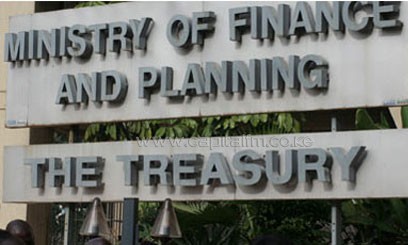This past week, the Principal Secretary in the Ministry of Planning and Devolution, the National Youth Service Director General and 26 other individuals were charged with different offences relating to the alleged fraudulent IFMIS transactions at the National Youth Service.
The Office of the Director of Public Prosecutions is prosecuting the Principal Secretary and the DG for allegedly attempting to dissuade NYS Deputy Director Adan Harakhe from reporting and reversing the irregular payment of Sh695 million through the Integrated Financial Management System (IFMIS).
Earlier in September, when reports of misappropriation of funds at NYS surfaced, Harakhe said his IFMIS password had been stolen in an attempt to steal Sh800 million. Although Planning and Devolution CS Anne Waiguru said at the time that no money was lost, she later confirmed Sh826 million had been irregularly paid out to suppliers.
The alleged embezzlement of funds at NYS is just one of the many financial scandals that have come into the public limelight resulting in the perception that corruption is at an all-time high. However, a factor that has often been overlooked is the fact that detecting financial impropriety is now easier thanks to ICT systems like IFMIS.
Transparency International Kenya Executive Director, Samuel Kimeu, says technology is a key enabler in the fight against corruption.
“Systems like IFMIS are still critical to the fight against corruption for this simple reason – the electronic trail that it delivers to investigators. Where it (IFMIS) has been misused the trail is easy to follow and it tells you what exactly happened, making possible to apportion responsibility,” says Kimeu.
Digitizing government transactions is a strategy the current and previous administration has adapted to inject transparency and improve efficiency in the public sector. But it has not been without hurdles.
IFMIS, for example, was introduced in 2004 by Treasury to improve accountability in the management of public finance by providing real-time financial information and assigning roles and passwords for every officer. But it was not until the 2012/2013 financial year did the government use the system to plan and implement the budget.
Automation of procurement, which is often viewed as the golden goose of corrupt deals, faced delays and numerous obstacles due to staff sabotage and management resistance, according to a University of Nairobi study. Indeed, County government officials have publicly criticized the e-procurement system saying it is complicated to use.
Persistence delays led President Kenyatta to issue a two-week ultimatum for the implementation of the procurement module of IFMIS in June this year.
The President had earlier cancelled tenders worth Sh288 Billion and threatened to dismiss 21 senior accounting officers for procuring goods and services outside the government’s e-procurement system, a component of IFMIS.
Corruption rot or higher exposure?
The e-procurement module enforces a strict purchase 28-step process from a procurement plan to payment, or what is known as Purchase to Pay (P2P).
“The process ensures that there are checks and balances in the procurement process and that all the people involved are accountable and that there is segregation of duties in procurement. This means that no single user can carry out a procurement transaction from requisition to payment,” explains Jerome Ochieng, IFMIS Director.
He further adds the system has an approval hierarchy where two or three different officers prepare, validate or approve purchases. Ochieng admits officers can conspire to feed the system with inflated costs from the planning stage but clarifies it is easier to see where and who collaborated in the event of fraud.
IT analysts, however, raise pertinent issues of security and offline collusion to beat the system as was the case in Malawi. In 2013, massive looting by state officials was reported in the country in spite of an operational IFMIS program in place.
The ‘cash-gate’ scandal, as it was christened, led to a public outcry ultimately resulting to the ouster of President Joyce Banda’s two-year-old government.




































